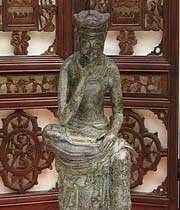Thinking and Language (2)
B. Language = limitation for thinking
Therefore, language can only be limitation for our rational or discursive thinking, because rational thinking is nothing else than language in our mind. We think the same way as we would express the thoughts as words in our language. We know, however, that rational thinking is only one small part of human thinking as such. Reason uses a much wider scope of ideas and principles, which transcend the possibilities not only of language but of rational thinking.
C. Thinking is bound to language
Thinking is bound to language this is clearly wrong. The opposite is the case: language is bound to thinking.
Thinking is the primary act of the human mind and language is the expression of thinking through articulated sounds that bear certain significance for congenial beings.
Rational thinking only is dependent on language, because rational thinking is identical to language, and thus a reciprocally coextensive means of conceptualization. The higher philosophical thinking, and Paranoetic or Intuitive Thinking specifically (paranoesis), is independent of language, because noetic thinking needn’t necessarily be expressed in language. Philosophical knowledge or wisdom contains more than can be expressed by and language, even though certain terms, used for example in ancient Greek, with original meanings and being not translatable, are notwithstanding limited, because a much more complex meaning has to be compressed into a single word, which lends itself to a wide range of possible interpretations. The primary idea in our mind is a complex pattern of differently connected and interconnected ideas, and this compound form is called a Hologeme. Hologemes are inexpressible and can only be understood by our mind alone. Therefore, real philosophical communication goes from mind to mind, using language only as a very inadequate carrier of information. On the level of philosophical communication, language has lost its predominant significance, such as it usually possesses in our rational world.

D. It is not possible to think without using language
From what I said above, this thesis should be evidently recognized as begging the question. Philosophical knowledge or "Erkenntnis" (as opposed to rational knowledge or "Wissen") is hologemic by nature. First there is the "Erkenntnis" of a fundamental truth or principle in philosophy, and in a second step, the Philosopher tries to articulate his hologemic knowledge in the realm of rationality by using language as the common means of understanding and communication. We often have ideas, anticipations, hunches, premonitions, intuitions etc. all of which are not bound to language and cannot be expressed in it at all. These are not single thoughts that correspond to equal single words in our language, but these are complex thought- structures that have no direct relationship to single words. Language is a particularized structure, drawing heavily on our analytical way of thinking. The corresponding manner of thinking is rational thinking.
Higher and more complex forms of thinking are not analytic or particularizing, but synthetic and holistic.
Therefore language would not the right means of expression. Complex Processes of thinking cannot be transformed equally into language as it is the case with discursive thinking.
E. Language = domain of truth
This thesis is only true if restricted to pure logical truth.
Formal language could be the domain of formal truth. It is possible to analyze language insofar as to determine whether truth or falsity appears in it.
Not the truth of an idea expressed in language is considered in this process, but only the formal truth of non contradiction as well as of other logical laws. This formal truth pattern may be transposable to rational thinking, thereby excluding for example contradictory statements, but in higher forms of thinking these logical laws are valid any more. Philosophical wisdom is often expressed in paradoxical statements (see Socrates: I know that I don’t know, or Koans in Zen Buddhism).
source: http://www.hyponoesis.org
Other limnks:
The meaning and concept of philosophy in Islam
1-Modern Philosophy of Language
Islamic philosophy